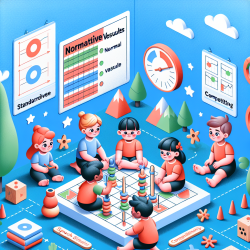Introduction
The estimation of geographical slant, such as the steepness of a hill, has been a subject of extensive research. A recent study, "Do Individual Differences and Aging Effects in the Estimation of Geographical Slant Reflect Cognitive or Perceptual Effects?" explores how cognitive factors, rather than perceptual ones, influence these estimations. This blog post will delve into the findings of this study and discuss how practitioners, particularly those in speech-language pathology, can apply these insights to improve educational outcomes for children.
Key Findings from the Research
The study conducted by Dean et al. (2016) analyzed the slant estimation abilities of individuals, considering factors such as age, experiential knowledge, fitness, and personality traits. The research concluded that cognitive factors significantly impact slant estimation. Here are some key findings:
- Age and Experience: Older adults tend to provide more accurate slant estimates compared to younger individuals, possibly due to accumulated experiential knowledge over time.
- Conscientiousness: Individuals with higher conscientiousness, especially those with prior experiential knowledge, tend to make more accurate slant estimations.
- Sex and BMI: Female participants and those with higher BMI tend to overestimate slant, which may be influenced by cognitive and social factors rather than perceptual differences.
Implications for Practitioners
Understanding the cognitive influences on slant perception can have practical implications for practitioners working with children in educational settings. Here are some ways practitioners can apply these insights:
- Enhancing Cognitive Awareness: Encourage children to engage in activities that enhance cognitive awareness and experiential learning, such as outdoor play and exploration, to improve their perception and estimation skills.
- Personalized Learning Approaches: Tailor educational strategies to accommodate individual differences in cognitive abilities and personality traits, fostering a more inclusive learning environment.
- Promoting Conscientiousness: Develop programs that promote conscientious behaviors, such as goal-setting and reflective practices, to enhance children's ability to apply cognitive knowledge effectively.
Encouraging Further Research
While the study provides valuable insights, further research is needed to explore the complex interplay between cognitive and perceptual factors in slant estimation. Practitioners are encouraged to contribute to this field by conducting studies that examine these factors in diverse populations and settings.
To read the original research paper, please follow this link: Do Individual Differences and Aging Effects in the Estimation of Geographical Slant Reflect Cognitive or Perceptual Effects?










